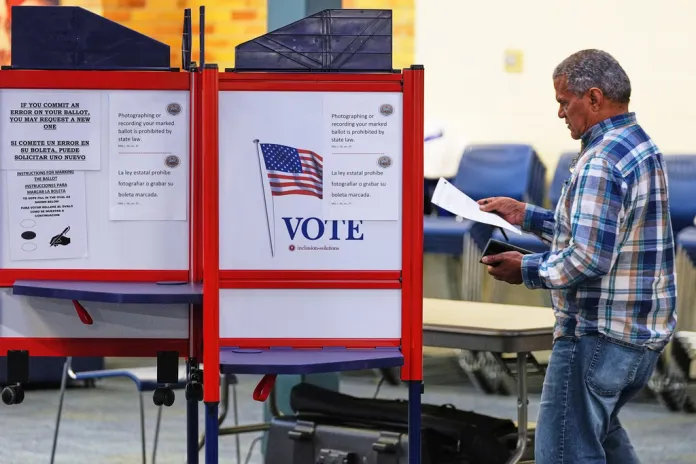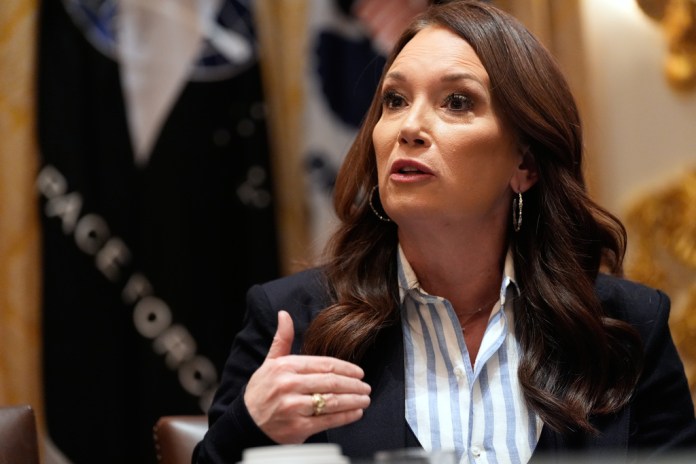The three factions holding up Trump’s ‘one big, beautiful bill’
The article discusses the challenges faced by House Republicans in rallying support for a $4 trillion tax-cut and spending bill, referred to as the “One Big, Beautiful bill”. With a slim majority in the House, leadership, including House Speaker Mike Johnson, is struggling to negotiate with three distinct factions within the party: the SALT Republicans, the deficit hawks, and moderate centrists.
1. **SALT Republicans**: This group is advocating for an increase in the state and local tax (SALT) deduction cap from $10,000 to a higher amount, with some seeking as much as $62,000. Their demands have created internal conflict,especially as the proposed increase of $30,000 remains a point of contention.
2. **Deficit Hawks**: Members of this faction are pushing for deeper spending cuts, arguing that the bill does not adequately address the rising national debt and fiscal obligation. Their opposition contributed to the bill’s failure in the Budget Committee, with calls for immediate implementation of Medicaid work requirements and substantial cuts to federal spending.
3. **Centrists**: This group opposes severe cuts to assistance programs like Medicaid and the Supplemental Nutrition Assistance Program (SNAP), fearing that such changes could harm vulnerable populations in their districts. They demand assurances that the final bill will not include substantial reductions in these services.
As the factions negotiate, leaders face a tough deadline before Memorial Day, and the potential for significant alterations in the Senate looms, as they may redefine the legislation further. Amid the struggle, President Trump has urged party unity to push the bill forward.
The three factions holding up Trump’s ‘one big, beautiful bill’
Three factions of House Republicans are imperiling leadership’s efforts to shepherd the party’s $4 trillion tax-cut and spending bill to passage.
Republicans hold a very slim margin in the House and can only afford to lose a couple of votes on their massive fiscal legislative package, which they are trying to pass through reconciliation, a legislative process that allows bills to bypass the filibuster and pass with only a simple majority in the Senate.
The small size of the majority and the political necessity of passing the legislation, which President Donald Trump and Republicans have dubbed the “One Big, Beautiful Bill,” have allowed small groups of lawmakers to band together and exact concessions.
The problem is that the group’s demands are mutually opposed in some ways. House Speaker Mike Johnson (R-LA) has been holding meetings with the various factions in an effort to reach an agreement.
Although the biggest chunk of the legislation — the tax portion — was approved by the Ways and Means Committee with unanimous Republican support this week, a few holdouts tanked the overall reconciliation package in the Budget Committee on Friday.
Now, Trump, Johnson, and the rest of House leadership will have to deal with placating these three factions — a task that will prove challenging as the lower chamber inches closer to Johnson’s self-proclaimed Memorial Day deadline. Here are the main factions and where things stand.
The SALT Republicans
The current $10,000 cap on state and local tax deductions has been one of the trickiest obstacles for Republican leadership.
Some House Republicans from high-tax blue states, such as New York Reps. Mike Lawler and Nick LaLota, have demanded a much bigger SALT cap increase than what leadership has reportedly offered. They argue that the cap imposed as part of the 2017 Tax Cuts and Jobs Act is too low.
The Ways and Means Committee proposed and approved the bill to increase the $10,000 SALT cap for married couples to $30,000 and set an income limit of $400,000. While the proposal would triple the SALT cap, the SALT Republicans maintain that $30,000 is too low.
And, notably, there is even dissent within that group of lawmakers.
The only member of the SALT Caucus on the Ways and Means Committee is Rep. Nicole Malliotakis (R-NY), who publicly endorsed the $30,000 cap offer during the markup on Tuesday.
Later, she was reportedly kicked out of a meeting between SALT members and Johnson.
“As the only SALT caucus member on Ways and Means, all I know is they can sit and negotiate with themselves all they want, but there will be no changes unless I and the committee agree,” she said.
Lawler has projected anger about the situation. He also hit at Ways and Means Chairman Jason Smith (R-MO) during negotiations this week.
“The chair should be reminded that he wouldn’t have a ******* gavel without the members of the SALT caucus,” Lawler said.
For their part, the SALT caucus members, minus Malliotakis, have pushed to raise the cap to $62,000 for individuals and $124,000 for joint filers. This move would likely raise the price tag on reconciliation and be met with annoyance from the overwhelming majority of the Republican conference, who generally don’t want the $10,000 cap lifted.
As of Friday, there have reportedly been talks of raising the cap to $40,000 for individuals and $80,000 for joint filers, although the negotiations are likely to drag on in the coming days as the SALT Caucus works to get the most out of its political capital.
And it’s not just that the SALT Republicans are passionate about the measure from a policy standpoint — it is just as much, and perhaps more so, a self-preservation push. Many are in vulnerable districts and have vowed to raise the cap.
The deficit hawks
The deficit hawks pushing for big spending cuts are also a massive headache for Johnson. They say that the current version of the tax and spending legislation does too little to reduce deficits or right the country’s fiscal ship.
Four such members were why the Budget Committee failed to advance the legislation on Friday. Reps. Ralph Norman (R-SC), Josh Brecheen (R-OK), Andrew Clyde (R-GA), and Chip Roy (R-TX) voted “no” with Democrats. Rep. Lloyd Smucker (R-PA) also changed his vote to no, although he clarified that he did so for procedural reasons and does support the legislation.
All of the Republicans on the Budget Committee who held out on the legislation are members of the conservative Freedom Caucus. The Freedom Caucus said in a statement after the vote that, despite its opposition to the legislation in its current form, it will continue to work in “good faith” to pass the bill.
During the hearing on Friday, Roy spoke out about how the new work requirements for Medicaid wouldn’t start immediately. As the bill is currently written, they would be set to begin in 2029. He and others say they should take effect sooner.
The conservative holdouts argue that the point of the spending cuts should be to drive down deficits, and have called for deeper cuts than what others in the party might want.
“This bill falls profoundly short,” Roy said. “It does not do what we say it does with respect to deficits.”
“We shouldn’t say that we’re doing something we’re not doing,” he added. “The fact of the matter is this bill has backloaded savings and has frontloaded spending.”
Roy also shared a chart featuring data from the Committee for a Responsible Federal Budget that modeled the legislation’s effect on deficits in the coming years on social media. He had the same chart behind him when he spoke during the hearing.
Altogether, the bill as written would add $2.8 trillion to the debt over the next decade, according to a tally from the CRFB. The total would be significantly higher, though, if all the temporary tax cuts were made permanent, or if certain scheduled spending cuts don’t take effect.
“Sadly, I’m a hard no until we get this ironed out,” Norman said during the hearing. “And I think we can, we’ve made progress, but it just takes time.”
The centrists
Just as there are Republicans like Roy and Norman calling for deep cuts to social spending programs and for serious, if not hard, decisions regarding the timing and degree of such cuts, some centrists are pressing leadership to exclude such measures from the final bill.
These centrists say they don’t think it is a good policy or political move to pare back federal assistance programs such as Medicaid or the Supplemental Nutrition Assistance Program, often called food stamps.
If Johnson is forced to make deeper spending cuts to these programs than what is already in the plan, which could result in people falling off the rolls, the centrists might balk and threaten to withhold their votes. This is an especially significant concern for Republican lawmakers in districts with high Medicaid enrollment and in swing districts.
A dozen people in this faction, which has some crossover with the SALT faction, sent a letter to Johnson and House leadership last month, saying that while they are OK with targeted reforms to Medicaid that improve the program’s integrity, they won’t vote for legislation if it contains cuts that they consider too big.
The lawmakers, including Reps. David Valadao (R-CA), Don Bacon (R-NE), Rob Bresnahan (R-PA), and more emphasized: “We cannot and will not support a final reconciliation bill that includes any reduction in Medicaid coverage for vulnerable populations.”
The pushback against Medicaid and SNAP cuts has been a factor since the bill’s inception. For instance, Bresnahan objected to big cuts when the Washington Examiner spoke to him in February.
“We will not tolerate gutting a benefit that over 27% of my district depends on,” he said. “And I think that’s where this reconciliation process, should this make it through to the reconciliation process, we will be ardent supporters of those programs.”
P.S.: There is still the Senate
The House has received outsize attention as part of the reconciliation process, largely because of the slim Republican majority. However, when or if the legislation passes the House, the Senate will take it up and could implement its own changes.
Exactly how much it could be changed depends on who you ask. For instance, the Washington Examiner spoke to Sen. Ron Johnson (R-WI) about it this week, and he predicted that the OBBB would collapse.
“I’m not sure it’s going to pass the House, quite honestly,” Johnson said. He stressed that while he wants reconciliation to succeed and to see many of Trump’s agenda items approved, he also sees a need to reduce spending meaningfully.
Johnson also called the institution of the $10,000 SALT cap one of the “real achievements” of the 2017 tax cuts and said that ideally it would stay there. He also suggested breaking up the legislation into multiple parts and passing them separately rather than in one bill.
When asked by the Washington Examiner if she thinks there will be “big” changes once the Senate gets it, Sen. Cynthia Lummis (R-WY) said she wasn’t sure if they would be big, but that the upper chamber would “tweak it.”
As the factions continue negotiations in the House, it is increasingly likely that Trump might try to intervene. He has done so in the past, calling lawmakers about votes.
HOUSE REPUBLICANS PASS $4 TRILLION TAX CUT OUT OF COMMITTEE AS MEMBERS DEBATE SALT CAP
Trump took a jab at the holdouts on Friday amid the Budget Committee hearing, calling for Republicans to unite behind the bill.
“We don’t need ‘GRANDSTANDERS’ in the Republican Party,” the president wrote on social media. “STOP TALKING, AND GET IT DONE! It is time to fix the MESS that [former President Joe] Biden and the Democrats gave us. Thank you for your attention to this matter!”
" Conservative News Daily does not always share or support the views and opinions expressed here; they are just those of the writer."




